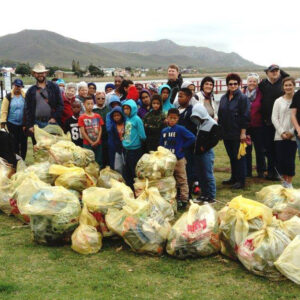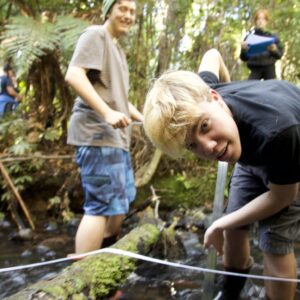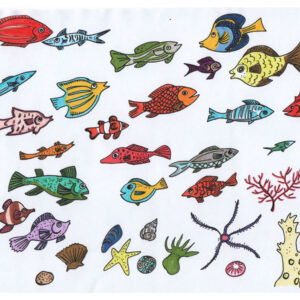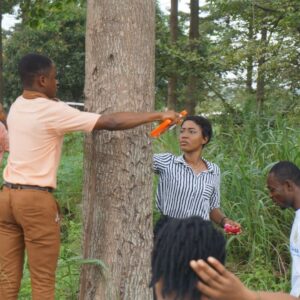
Environmental Education
Environmental Education
Connecting people and nature to inspire action for a sustainable world
Our worldwide environmental education activities enable people of all ages to:
- develop their knowledge, understanding and connection to the environment and their impact on it;
- encourage sensitivity to environmental issues and challenges;
- make informed and responsible decisions at the individual, community and organizational level.
A Rocha’s approach is to promote the enjoyment, care and sustainable use of the earth’s precious resources, encouraging the development of appropriate skills in response to the needs of local communities.
A Rocha's impact in environmental education
A Rocha’s EE programme contributes to the achievement of the Sustainable Development Goals (SDGs). Education is the cornerstone to achieving the SDGs and SDG 4 specifically – “Ensure inclusive and equitable quality education and promote lifelong learning opportunities for all.”
A Rocha has been working in environmental education for over 30 years. In 2022 we held 1,705 activities globally, involving 48,839 participants of all ages, including community events, workshops, teacher training, wildlife clubs, summer camps and school visits.
“We recognize that environmental education has become an essential component of education equal to reading, writing and arithmetic.”
The Economics of Biodiversity: The Dasgupta Review, HM Treasury, 2021
Environmental Education: People
We contribute towards the Sustainable Development Goals 1, 2, 3, 5, 9, 11, and 12, but also work with the private and public sectors.
- A Rocha International has been supporting global environmental education activities and staff with a coordinator since 2016. We collect and share resources, organize workshops and conferences, and train staff where needed.
- In Ghana, we carry out creative approaches to community environmental education.
- In South Africa and other countries, we promote Plastic Free February, encouraging people to have a plastic free month.
- In Uganda, we carry out environmental education through sustainable livelihoods, briquettes and bio-sand water filters.
Environmental Education: Land
We work towards the Sustainable Development Goals 1, 3, and 15 for Life on Land with projects around the world and people of all ages.
- In Portugal, A Rocha’s Alvor field study centre welcomes hundreds of school children each year to take part in outdoor activities based on the national science curriculum and led by A Rocha teachers, such as bird ringing or studying moths;
- In Kenya, A Rocha Kenya’s conservation clubs bring the classroom outside through fun activities;
- In Lebanon, A Rocha is creating urban green spaces in the Bekaa Valley.
Environmental Education: Water
We work towards the Sustainable Development Goals 2, 3, 6, and 12.
- In Ghana, leveraging the rich historical cultural values of the Ashanti kingdom to conserve Lake Bosumtwi – the only natural lake in Ghana – using culture and folklore;
- In Canada, helping young people and adults discover life in streams and ponds.
Environmental Education: Oceans
We work towards the Sustainable Development Goal 14 for Life Below Water.
- In the USA, nurdle hunting with schoolchildren, helping them love their place through citizen science. For example, Coastal Community School in Florida has established a project in partnership with A Rocha USA to study nurdles on Satellite Beach;
- In Kenya, studying rock pools and working with teachers and students in projects like ASSETS.
Environmental Education: Climate
We work towards the Sustainable Development Goals 7 and 13 for Climate Action working directly with students and households as well as indirectly through capacity development.
- In Ghana, young people changed behaviours on energy conservation in homes and schools;
- In Europe and Africa, teaching workshops to encourage action;
- With Climate Stewards, ongoing work to raise awareness.
Environmental Education: Resources
We collect, produce and share many publications, lesson plans and other supporting resources for A Rocha Environmental Education activities. Some of the most popular ones include:
- The Plastics toolbox
- From Peru a manual for children on dry forests, in Spanish;
- From the Netherlands, books and resources about ‘Eco-girl Christy’.
Support Environmental Education through Gifts with a Difference
PLEASE HELP US! Through ‘Gifts With a Difference’ at shop.arocha.org you could provide a Kenyan student to attend the ASSETS camp: a unique adventure, discovering the wildlife of the local coral reefs and rockpools, dry coastal forests and mangrove-fringed creeks.
A Rocha Kenya’s ASSETS programme meets the economic and social needs of communities living around the Arabuko-Sokoke Forest through the provision of secondary school scholarships. The forest is the largest remnant of a dry coastal forest that originally stretched from Somalia to Mozambique and is globally recognized for its rich biodiversity. Through the programme, children and their parents learn about the global significance of their local environment and become involved in practical conservation activities.
One of the goals of ASSETS is to mentor beneficiaries so that they can become Kenya’s future conservationists. So, during the April and August school holidays, selected students are invited to take part in the ASSETS camp and treated to all the good food and hospitality that Mwamba (the A Rocha field study centre) has to offer. The week is packed with activities: games, talks and outings to the forest and Mida Creek. The students also explore the reefs and rockpools of Watamu Marine National Park, which for most of them, is their first opportunity to swim or snorkel.


